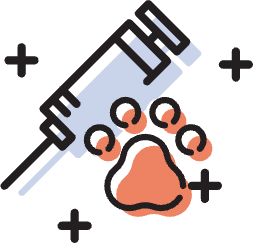
The Cost of Owning a Puppy: Months 1-6
Ready to bring a new puppy into your life? There is so much excitement around welcoming a new pup into your home that critical aspects of pet parenthood might get overlooked. This is especially true when it comes to the cost of care for your new pet.
Read on for a closer look at the average costs of caring for a puppy throughout their first six months. During this period, pet parents are responsible for a range of one-time costs, as well as recurring expenses they’ll face throughout their dog’s lifetime.
Weeks 1 - 8: Your Puppy’s First Days
Medical Needs

Pet Care Essentials
Food: When your puppy stops nursing between four and six weeks old, their breeder or caretaker will begin serving them soft puppy food. A month’s supply typically costs between $20 and $60. This will become a regular expense once your puppy comes home and it may be included in your purchase or adoption fee.
Weeks 8 - 12: Bringing Home Your New Pup
Purchasing or Adopting a Dog

Whichever option you choose, you probably won’t bring home your new dog until they’ve reached eight weeks of age. In some cases, breeders and shelters may wait until the pup has reached 12 weeks. That means you’ll miss out on a few key milestones (like their first baby teeth) and some early expenses like the ones listed in the previous section.
Medical Needs
Initial Veterinary Visit: Within the first week of bringing your puppy home, you should make your first trip to the vet. New dog owners could pay around $75 to $100 for this introductory visit. The vet will conduct a general examination to identify signs of congenital disorders or infections. They’ll also review your puppy’s vaccination history (expect to be charged if they haven’t had that first DAPP dose at this visit) and assess their stool to check for intestinal parasites. Don’t forget to bring along any medical records you have, a stool sample (if applicable), and any burning questions.
Heartworm Prevention: The American Heartworm Society encourages pet owners to begin treating their dogs with preventive medicine against heartworm when they’re around eight weeks of age. Treatment types vary, and your veterinarian may suggest oral, topical, or injectable preventive treatments. Typically, they recommend that pets undergo these treatments throughout the entire year. Depending on your dog’s weight, preventing heartworm will cost between $35 and $75 each year. If you’re on the fence about whether or not this is a necessary expense, keep this in mind: a single bite from an infected mosquito can cause heartworm, and preventing them is typically much less expensive than getting rid of them.
Bordetella Vaccine: The vaccine against Bordetella (also known as kennel cough) is optional, but some pet care establishments like dog daycares and overnight boarding facilities require pets to be vaccinated. It costs between $20 and $45 on average. If you choose to vaccinate your dog, it can be administered concurrently with their first dose of heartworm prevention medicine and the DAPP vaccine.
Canine Coronavirus Vaccine: Not to be confused with the vaccine for COVID-19, this vaccine protects pooches against a different type of respiratory illness. Sometimes, this vaccine is included with the DAPP vaccination, but as a stand-alone vaccination, it costs between $15 and $20.
Pet Care Essentials

Gear: Before your puppy arrives, you’ll want to visit the pet store for must-haves like bowls for food and water ($10 - $30), a leash, harness ($10 - $40) or collar ($5 - $20), and a crate ($40 - $200). If you have a small dog, you may need to purchase a carrier for trips to and from the vet, and other travel.
Identification: Once you’ve picked out a name for your pup, don’t forget to put it on their identification tag ($5 - $10).
Toys: Toys aren’t just about fun and games. They're useful for teaching basic commands, helping keep pets physically and mentally fit, and building a strong bond. As your puppy’s first set of 28 teeth begin to fall out and their new set of 42 adult teeth grow in, they’ll need plenty of toys to soothe their sore gums. You’ll want to keep them comfortable while keeping them away from your shoes, rugs, and furniture. Plan on spending at least $20 on their initial set of toys and as much as $100 during their first year.
Pet Insurance: At eight weeks of age, your puppy may be eligible to enroll in pet insurance. Like traditional health insurance, pet insurance may provide reimbursement for both emergency and routine expenses. Plans start as low as $15 per month for basic accident and illness coverage. Pet insurance companies offer more benefits for additional fees and give pet owners the option to customize plans to meet their pet’s needs.
Pet insurance can be a safety net for you and your pet, helping your pet care budget go further.
Get a free quote from PetPartners today.
Underwritten by Independence American Insurance Company
Weeks 12 - 16: Keeping Puppy Happy & Healthy
Medical Needs

DAPP Vaccine (2 of 3): About three weeks after their first DAPP shot, it’s time for your puppy to receive dose #2, which is another $20 to $30 expense.
Rabies Vaccine: Your dog will need a rabies vaccine to protect them from this deadly and widespread virus. The initial dose costs around $15 to $20 and your dog will get it somewhere between 12 and 16 weeks of age. Remember that your dog will need additional rabies boosters to keep up their immunity in the coming years.
Flea and Tick Prevention: After they’ve reached eight weeks of age, it’s safe for puppies to be treated with pest-prevention medications. If you live in a high-risk area, these treatments may be a year-round necessity. On average, a three-month supply of medication costs around $55.
Pet Care Essentials
Microchipping: Around 12 weeks of age, pets can be microchipped. The process is quick, effectively painless, and costs about $45 on average. You may need to pay an additional fee (around $20) to register your dog’s microchip in a nationwide database.
Food and Treats: Unless you bought in bulk or placed an autoship subscription, you’ll probably have to make at least one trip to the pet store to spend another $20 to $60 on dog food and treats.
Weeks 16 - 20: A Growing Pup
Medical Needs
DAPP Vaccine (3 of 3): About three weeks after shot #2, your puppy needs their third and final dose of the DAPP vaccine and you’ll need to pay another $20 to $30.
Leptospirosis Vaccination: Your vet may recommend vaccinating your puppy against Leptospirosis around this age. This disease of the kidneys and liver is mostly spread by infected rodents and is treatable with antibiotics. As with other canine illnesses, prevention is often less expensive than treatment. The vaccine costs between $75 and $100 on average.
Lyme Vaccination: This non-core, yearly vaccination is often recommended for active dogs who live in particularly high-risk parts of the country. If you plan to spend a lot of time hiking or outdoors with your pet, it may be a wise decision. However, keep in mind that indoor dogs are still vulnerable to ticks and Lyme disease. If you opt to vaccinate your pet against Lyme, you’ll likely pay between $20 and $40 each year.
Pet Care Essentials
Food and Treats: Still more food and treats and another bill around $20 to $60. Continue using treats as positive reinforcement to encourage good behavior and consult your veterinarian about any adverse reactions.
Weeks 20 - 24: Sit. Stay. Roll Over.
Medical Needs
Spaying or Neutering: Small-breed dogs should be spayed or neutered around six months of age. For larger breeds, surgery takes place later. Regardless of your dog’s size and breed, the procedure can cost as much as $500.
Pest Prevention: Depending on your pet’s schedule, it may be time to purchase another round of preventive medications for around $55.
Pet Care Essentials
Food and Treats: By now, you’ve hopefully learned to spot deals on your puppy’s preferred food and treats. Plan to spend another $20 to $60 this month and make sure to consult your veterinarian before making any updates to your dog’s diet.
Replacement Gear and Toys: Depending on their breed, your puppy may have already outgrown their first collar or harness. Be prepared to purchase replacements if necessary. Chances are that any dog will have chewed through their fair share of toys by this point as well, since many will continue teething until they reach eight months of age. By now, you’ve hopefully learned how to identify toys that can withstand heavy biting and chewing.
Training: Though you’ve likely been training your dog at home, first-time dog owners in particular may benefit from professional guidance. The experience won’t just promote obedience, it’ll also help socialize your dog and strengthen their bond with you. Private training sessions can cost hundreds of dollars an hour, but group training could cost just over $100 for several weeks of sessions.
What Costs Pet Insurance May Cover
Pet ownership can run up quite a bill. It’s not too late to think about the protection pet insurance can offer. Depending on the level of coverage you select, you may be able to help pay for expenses like:
- Vaccines
- Flea, tick, and heartworm prevention
- Wellness exams
- Dental cleaning
- Treatment for accidents and sudden illnesses
- Treatment for chronic and inherited conditions
- End-of-life expenses like burial fees

Purchasing a plan shortly after bringing home your puppy can even help you pay for microchipping and spaying or neutering.
Pet insurance can be a safety net for you and your pet, helping your pet care budget go further.
Get a free quote from PetPartners today.
Underwritten by Independence American Insurance Company.